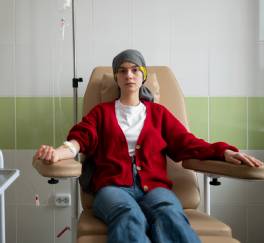 Book Appt.
Book Appt.
 Call Now
Call Now


Lymphomas are a group of blood cancers that originate in the lymphatic system, a vital part of the body's immune system. These cancers can affect individuals of all ages and represent a diverse range of diseases. Understanding the various types, causes, diagnoses, and treatment options for lymphomas is crucial for both healthcare providers and those affected by these conditions.
The Lymphatic System
The lymphatic system is an intricate network of lymph nodes, lymphatic vessels, and other tissues that play a crucial role in maintaining the body's immune function and fluid balance. Lymphocytes, a type of white blood cell, are central to the lymphatic system's function and are the cells primarily affected in lymphomas.
Types of Lymphomas
Lymphomas are broadly categorized into two main types: Hodgkin lymphoma (HL) and non-Hodgkin lymphoma (NHL). These two categories encompass several distinct subtypes, each with its own characteristics and prognosis.
Some common subtypes of NHL include diffuse large B-cell lymphoma (DLBCL), follicular lymphoma, mantle cell lymphoma, and marginal zone lymphoma.
Causes and Risk Factors
The exact causes of lymphomas are still not fully understood, but several risk factors have been identified:
Diagnosis and Staging
Diagnosing lymphomas involves a combination of clinical evaluation, medical history, physical examination, and various tests:
Once diagnosed, lymphomas are staged to determine the extent of the disease, which helps guide treatment decisions. Staging often involves the use of the Ann Arbor staging system, which classifies lymphomas from stage I (localized) to stage IV (advanced).
Treatment Options
The treatment approach for lymphomas varies depending on the type, stage, and individual patient factors. Common treatment modalities include:
Outlook
The prognosis for lymphomas varies widely depending on factors such as the subtype, stage at diagnosis, and the patient's overall health. Many individuals with lymphomas respond well to treatment and can achieve remission or even be cured. However, for some aggressive subtypes or advanced cases, the prognosis may be less favorable.
Regular follow-up care and monitoring are essential for individuals who have undergone treatment for lymphoma to detect any recurrence or long-term side effects of treatment.
SHALBY Sanar International Hospitals provides extensive medical procedures backed up with our state-of-the-art technology and a team of highly qualified & experienced clinical experts.
Our doctors pen down their research findings and experiences from time to time. Their words provide deep insight into the latest techniques, technologies and other advancements in healthcare. It provides expert answers to all kinds of health questions for real-life issues.
VIEW ALL



.jpg)
Since the day of its foundation, SHALBY Sanar International Hospitals is committed to provide comprehensive healthcare services. It regularly organizes awareness programs in its premises and encourages outdoor healthcare activities and camps with an intent to put focus on preventive healthcare.
VIEW ALL